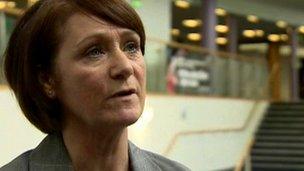Work of Historical Enquiries Team to be reviewed
- Published

The HET is reviewing more than 150 killings by soldiers
Independent inspectors are to review how the Historical Enquiries Team investigates killings by soldiers during the troubles.
The Chief Constable Matt Baggott has asked Her Majesty's Inspector of Constabulary to carry out the review following criticism in a University of Ulster report.
The report, by Dr Patrica Lundy, claimed the HET gives former soldiers preferential treatment and does not properly investigate deaths caused by the military.
The HET rejects the claims.
Dr Lundy's report was discussed at a meeting of the Policing Board on Thursday.
The HET is reviewing more than 150 killings by soldiers between 1970 and September 1973. It has rejected the criticism.
The specialist police team, which was set up in 2005 to re-examine 3,269 murders from the Troubles, is directly accountable to the chief constable.
In a statement on Tuesday, the PSNI said the chief constable recognised that concerns have been raised regarding some aspects of HET processes, and that he would respond to those issues when the report is discussed by the Policing Board.

Dr Patricia Lundy criticised the fact that soldiers were questioned as witnesses
Dr Patricia Lundy is a senior lecturer with the University of Ulster who spent more than two years reviewing how the cases are re-investigated.
"I don't believe it is independent. The research indicates that the interviews with soldiers are not impartial, they are not effective and they are not transparent," she said.
She claimed the HET gave soldiers "special treatment" by providing them with much more pre-interview material than in cases where republican or loyalist paramilitary killings were being investigated.
Dr Lundy also criticised the fact that soldiers were questioned as witnesses rather than as suspects.
"It is of considerable concern that there appears to be inequality in treatment where state agencies, in this case the military, are involved, compared to non-state or paramilitary suspects," her report states.
"There are examples in paramilitary-related history where suspects have received significantly less fulsome pre-interview disclosure. There is no clear rationale for this less favourable differentiation in treatment... the evidence suggests soldiers are given preferential treatment."
In a statement rejecting the criticism, the HET said there had been a number of cases where families of victims of Army shootings welcomed apologies from the government and Ministry of Defence after the HET dismissed the original military version of events.
- Published4 April 2012
- Published3 April 2012
- Published18 March 2012
- Published2 July 2010